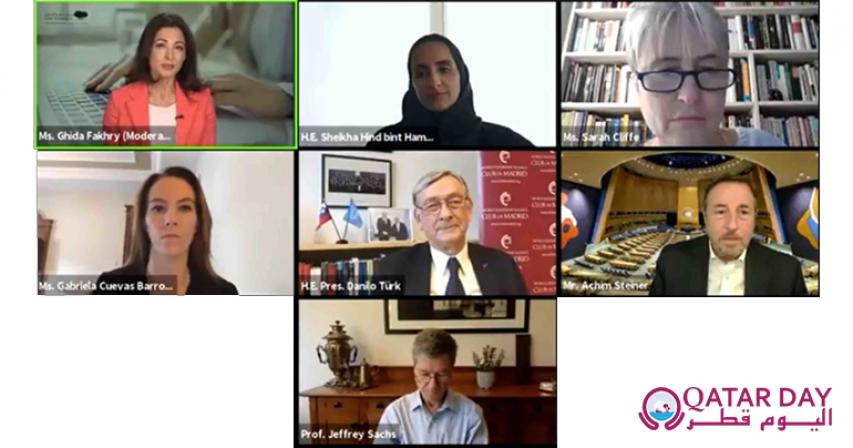QF’s Vice Chairperson and CEO tells Global Goals Week panel that quick fixes enforced by COVID-19 must not detract from what education’s “ultimate goal” should be on future learning.
Disrupting education means thinking about its true purpose and not solely focusing on technology, Her Excellency Sheikha Hind bint Hamad Al Thani, Vice Chairperson and CEO of Qatar Foundation, has emphasized during a global panel discussion on the future of learning.
Organized by Qatar Foundation as part of its contribution to the 2020 Global Goals Week, COVID-19 and Education: The Largest Disruption in the History of Education brought together experts and education advocates from around the world to explore whether the pandemic can be a catalyst for a genuine educational transformation – and, if so, whether the world is ready to capitalize on it.
And describing disruption in education as now being “a way of life”, Her Excellency Sheikha Hind told the virtual discussion: “We talk about access to technology, but it is just a tool – it doesn’t really look at whether our children are learning or not, or how it will help them prosper in the world. - We have to go back to what we are teaching our children, and for what purpose.”
“Why don’t we invest our time in a long-term fix rather than a short-term one? It’s not that technology is irrelevant, or that we shouldn’t provide more technology or more internet networks for communities that need them, but let’s not lose our focus on the true purpose of education and what its true goal should be.
“Technology is not a fix for everything. Now, we are in a pandemic and we have to make do with what we have, so our reaction is to try to continue education by doing it online. But is that the ultimate for my children? Absolutely not. We can’t create technology that substitutes for a learning environment that encompasses so many different elements, and is not just about the content and the knowledge that a child acquires.”
While saying that the world is “not even close to disrupting education to how it should look”, Her Excellency Sheikha Hind explained: “What has happened today, with COVID-19, has allowed us to reflect on how some tools that we thought were so important have actually proved to be irrelevant.
“The fact students didn’t have to sit exams and still graduated from high school and managed to go to university tells us a lot. There are ways around things that we thought were core principles of how education should look.
“Once we figure out what the true purpose of education is, a lot of the issues we face will be resolved. If our ultimate purpose is to nurture self-motivated learners, whether they are children or adults, these issues would be miniscule.”
Speaking about her own vision for the future of education, Her Excellency Sheikha Hind said: “Moving forward, we must recognize that whatever we have been doing for centuries is obviously not working, and the pandemic has proven to us that even the quick fixes we have had are also not working.
“The question now is how we work in parallel – providing the short-term solutions we do need for children, parents, and teachers who are suffering, but at the same time having a long-term vision to understand what our ultimate goal is. Is it to graduate a number of students every year, or is there really a purpose behind what we do?
“Much more reflection is happening in education today, because we have a feeling that our education systems are not resilient enough. The more we experiment and take risks, the better prepared we will be the future. And we should not be worried about taking risks; we are in a pandemic and people are willing to try new things, because we have seen first-hand that what we have is not working for everyone.”
Among those joining Her Excellency Sheikha Hind in the panel discussion was Danilo Türk, former President of Slovenia, who warned that COVID-19 had had deepened “faultlines between those who can afford distance learning and those who cannot”, and suggested that countries such as Qatar that have had “a long-term vision for education” can show leadership in this field to the world.
Sarah Cliffe, Director of the Center on International Cooperation at New York University, told the session: “We need to focus on people-centered education in a broad sense – the education of children and young people as members of society who want to grow throughout their lives, not only people who we want to encourage to be part of the economy.
“Universities were founded on that basis, but have perhaps moved away from it, and now that we are seeing increased polarization in society, they perhaps need to shift back to thinking about their broader role in educating citizens. We also have to think about how we are equipping people for the future, because educating young people in much higher numbers if they can’t go on to find jobs is a recipe for tension rather than success.”
Speakers also included Achim Steiner, Administrator of the United Nations Development Programme; Gabriela Cuevas Barron, President of the Inter-Parliamentary Union; and Professor Jeffrey Sachs, Director of the Center for Sustainable Development at Columbia University.

Comments